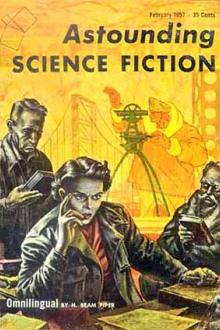A Tale of Two Cities - Charles Dickens (classic books to read .TXT) 📗

- Author: Charles Dickens
Book online «A Tale of Two Cities - Charles Dickens (classic books to read .TXT) 📗». Author Charles Dickens
No crowd was about the door; no people were discernible at any of the many windows; not even a chance passerby was in the street. An unnatural silence and desertion reigned there. Only one soul was to be seen, and that was Madame Defarge—who leaned against the doorpost, knitting, and saw nothing.
The prisoner had got into a coach, and his daughter had followed him, when Mr. Lorry’s feet were arrested on the step by his asking, miserably, for his shoemaking tools and the unfinished shoes. Madame Defarge immediately called to her husband that she would get them, and went, knitting, out of the lamplight, through the courtyard. She quickly brought them down and handed them in;—and immediately afterwards leaned against the doorpost, knitting, and saw nothing.
Defarge got upon the box, and gave the word “To the Barrier!” The postilion cracked his whip, and they clattered away under the feeble over-swinging lamps.
Under the over-swinging lamps—swinging ever brighter in the better streets, and ever dimmer in the worse—and by lighted shops, gay crowds, illuminated coffeehouses, and theatre-doors, to one of the city gates. Soldiers with lanterns, at the guardhouse there. “Your papers, travellers!” “See here then, Monsieur the Officer,” said Defarge, getting down, and taking him gravely apart, “these are the papers of monsieur inside, with the white head. They were consigned to me, with him, at the—” He dropped his voice, there was a flutter among the military lanterns, and one of them being handed into the coach by an arm in uniform, the eyes connected with the arm looked, not an every day or an every night look, at monsieur with the white head. “It is well. Forward!” from the uniform. “Adieu!” from Defarge. And so, under a short grove of feebler and feebler over-swinging lamps, out under the great grove of stars.
Beneath that arch of unmoved and eternal lights; some, so remote from this little earth that the learned tell us it is doubtful whether their rays have even yet discovered it, as a point in space where anything is suffered or done: the shadows of the night were broad and black. All through the cold and restless interval, until dawn, they once more whispered in the ears of Mr. Jarvis Lorry—sitting opposite the buried man who had been dug out, and wondering what subtle powers were forever lost to him, and what were capable of restoration—the old inquiry:
“I hope you care to be recalled to life?”
And the old answer:
“I can’t say.”
Book the Second The Golden Thread I Five Years LaterTellson’s Bank by Temple Bar was an old-fashioned place, even in the year one thousand seven hundred and eighty. It was very small, very dark, very ugly, very incommodious. It was an old-fashioned place, moreover, in the moral attribute that the partners in the House were proud of its smallness, proud of its darkness, proud of its ugliness, proud of its incommodiousness. They were even boastful of its eminence in those particulars, and were fired by an express conviction that, if it were less objectionable, it would be less respectable. This was no passive belief, but an active weapon which they flashed at more convenient places of business. Tellson’s (they said) wanted no elbow-room, Tellson’s wanted no light, Tellson’s wanted no embellishment. Noakes and Co.’s might, or Snooks Brothers’ might; but Tellson’s, thank Heaven—!
Any one of these partners would have disinherited his son on the question of rebuilding Tellson’s. In this respect the House was much on a par with the Country; which did very often disinherit its sons for suggesting improvements in laws and customs that had long been highly objectionable, but were only the more respectable.
Thus it had come to pass, that Tellson’s was the triumphant perfection of inconvenience. After bursting open a door of idiotic obstinacy with a weak rattle in its throat, you fell into Tellson’s down two steps, and came to your senses in a miserable little shop, with two little counters, where the oldest of men made your cheque shake as if the wind rustled it, while they examined the signature by the dingiest of windows, which were always under a shower-bath of mud from Fleet-street, and which were made the dingier by their own iron bars proper, and the heavy shadow of Temple Bar. If your business necessitated your seeing “the House,” you were put into a species of Condemned Hold at the back, where you meditated on a misspent life, until the House came with its hands in its pockets, and you could hardly blink at it in the dismal twilight. Your money came out of, or went into, wormy old wooden drawers, particles of which flew up your nose and down your throat when they were opened and shut. Your banknotes had a musty odour, as if they were fast decomposing into rags again. Your plate was stowed away among the neighbouring cesspools, and evil communications corrupted its good polish in a day or two. Your deeds got into extemporised strongrooms made of kitchens and sculleries, and fretted all the fat out of their parchments into the banking-house air. Your lighter boxes of family papers went upstairs into a Barmecide room, that always had a great dining-table in it and never had a dinner, and where, even in the year one thousand seven hundred and eighty, the first letters written to you by your old love, or by your little children, were but newly released from the horror of being ogled through the windows, by the heads exposed on Temple Bar with an insensate brutality and ferocity worthy of Abyssinia or Ashantee.
But indeed, at that time, putting to





Comments (0)